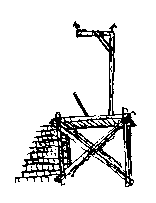 |
|
 |
||||||
Religion: |
||||||
Pope John Paul II opposes capital punishment. That makes no sense. The pope could say, "I oppose capital punishment and renounce any claim to spiritual authority by virtue of my office." That would make sense. But it's outlandish hypocrisy for the Pope to oppose capital punishment and still claim that popes are reliable sources of spiritual authority. Hundreds of years ago, the popes were all over capital punishment. It was their men doing the torturing, the sentencing, and the executing. They didn't have any problem with capital punishment. It was a source of power for them, and they were into it. These heretic-burning popes embodied the same spiritual authority that today's pope claims. But now we've stripped the Catholic Church of its authority to torture, sentence, punish, and kill people. Now that the clergy aren't the ones doing the killing, the pope's against it. The problem is that the pope claims that a pope's position and a pope's rules are God's doing, not his own. He can't distance himself from the popes that oversaw inquisitions and witch-burnings. Lutherans can distance themselves from Luther's anti-Semitism or whatever because Lutherans don't claim anything more than fallible humanity for Luther. But the whole point of the pope is continuity of spiritual authority. Which is to say that those medieval, Jew-torturing, witch-burning popes were on the same spiritual level as today's pope. By opposing capital punishment, the pope declares his predecessors as (at best) failed instruments of God's wisdom. By virtue of apostolic succession, he declares his own doctrines fallible and his spiritual authority suspect. —JoT
PS: In 2000, Pope John Paul II, referring to the Inquisition, asked pardon for "errors committed in the service of the truth through recourse to non-evangelical methods." This careful wording demonstrates the same outrageous understatement that has marked the Pope's comments about US bishops' cover-up of sex abuse by priests.
|
||||||